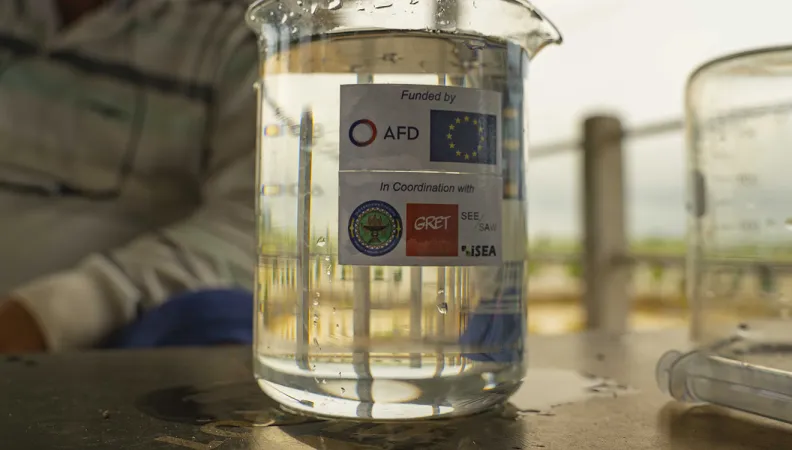Share the page
AFD Group's Partnerships Around the World
Published on

Partnerships account for a large portion of AFD’s operations. Whether they take the form of delegations, direct funding or co-financing, partnerships are fundamental to the Group’s activity. Below is a review of this teamwork for development.
AFD's activity cannot be fully understood without considering its partnerships. This work covers a wide range of sectors, such as infrastructure, water, sanitation, biodiversity, and healthcare. Our projects aim to meet the needs of populations in all countries having recourse to public development aid. “Partnerships account for almost half of AFD's projects,” says Céline Boulay, Deputy Head of AFD's Partnerships Department. This amounts to €3 billion per year.
Moving forward together
There are two distinct financing options: on the one hand, there is the direct granting of funds to civil society organizations (CSOs), such as non-governmental organizations (NGOs), trade unions, public or private foundations, or even cooperatives; on the other hand, there is co-financing, i.e. when two donors are funding the same project.
Between 2017 and 2020, the Group (AFD and Proparco) tripled the financing granted to operational activities with CSOs, which increased to €422 million in 2020, a new record. In that same year, the total amount of co-financing with other donors amounted to €2.825 billion, i.e. 39% of AFD’s loan commitments.
“For certain projects, we have managed to unite coalitions of donors around a common, a global issue,” says Céline Boulay. The Kiwa initiative for biodiversity and climate change adaptation in the Pacific is a good example. Announced by the French President at the 2017 One Planet Summit, the Kiwa initiative was launched in March 2020. “For the first time, five international donors – Australia, Canada, France, New Zealand and the European Union – have mobilized their resources to support the Pacific island states and territories in finding common solutions to climate change,” says Céline Boulay.
Adapting to crises
2020 was marked by the pandemic, and in developing countries, the situation was compounded by crisis upon crisis, whether economic, social or security-related. In order to address these issues, 30% of the co-financed projects were focused on combating Covid-19, and 40% of these involved AFD's Africa Department. Some €10 million was released for 17 projects to help mitigate the health crisis.
Partnerships are synonymous with responsiveness. From the start of the pandemic, AFD has been mobilized in the fight against Covid-19 and its repercussions. The Health in Common initiative was thus launched in April 2020, with grants and concessional loans being released to mainly African countries. The objective is to strengthen their health care systems, support medical research, and build their capacities for screening and treating patients. “The Health in Common initiative is just one example of AFD's close relations with civil society organizations,” says Céline Boulay.
In the wake of the double explosion in the port of Beirut, an unprecedented partnership was established between the Fondation de France and AFD. The aim was to help the Lebanese people, who had already been experiencing a profound social and economic crisis. AFD therefore decided to double every donation made to the Fondation de France. This operation, known as Solidarité Liban, enabled the disbursement of funds to local stakeholders on the ground, providing support for social and psychosocial initiatives, local economic stimulus, and housing, as a priority.
Based on these actions, AFD has been expanding its partnership operations year upon year. Establishing dialogue with stakeholders in the field has proven to be an effective strategy in the midst of such crises. Consequently, these programs have become better and better at meeting the needs of communities, and at doing so more quickly.
International and European partnerships, a driver of development
Common objectives require common solutions. AFD and the European Union share a number of common challenges and have thus been consolidating their partnership in recent years. In 2020, AFD committed €363 million in financing from EU resources. The year 2020 was also noteworthy for the continued implementation of the External Investment Plan (EIP): as part of the European Fund for Sustainable Development, the first two guarantee agreements between AFD and the European Commission were signed.
With regard to AFD's response to the Covid-19 crisis, according to an initial estimate, 85% of the external financial resources – including loans and grants –have come from multilateral actors (multilateral development banks, the EU and the Global Partnership for Education). In 2021, the Group will continue to work in partnership on a European and international scale, with the deployment of new instruments that will benefit civil society.
The Ficol FACILITY, serving local authorities
In development terms, there is no doubt that the more decisions made locally, the more effective the results. To this end, since 2014, AFD has been equipped with a tool called the French Local Authorities Financing Facility (FICOL), where 61 French local authorities, from the municipal to the regional level, support projects in developing countries, whether based in natural parks, towns or cities.
Currently financing 57 projects, representing a total of €32.2 million in grants, the Ficol facility is reviewing another 23 projects. “In 2020, AFD spent its €9 million budget on co-financing 14 projects in 14 different countries,” says Céline Boulay.
For example, in 2020, AFD helped the city of Strasbourg to establish biodiversity and sustainable urban farming areas in Kampala, Uganda, thus improving food and economic security for its inhabitants, preserving its green spaces and areas for the city’s extracurricular activities. Such efforts protect biodiversity and improve basic services, such as water, sanitation, waste and electricity.
Under the Ficol framework, such projects promote both development and dialogue between local authorities from different countries.
